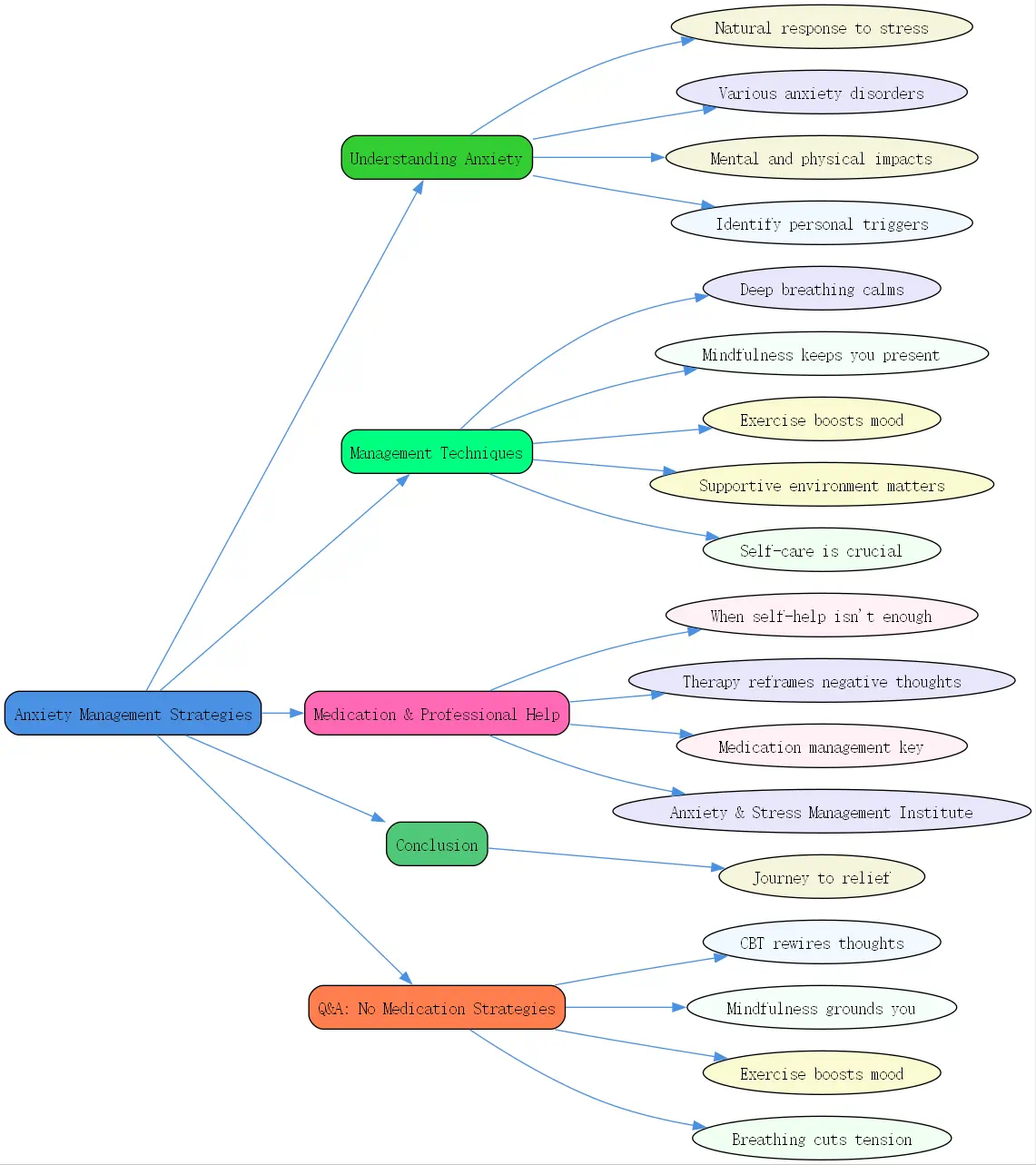At BrainTalking, we understand the challenges of living with anxiety. As a trusted resource in psychology and mental health, we’re committed to providing you with evidence-based strategies and expert insights to help you navigate your anxiety journey. Anxiety affects millions worldwide, ranging from fleeting unease to overwhelming conditions that disrupt daily life. Fortunately, there are effective ways to manage it. In this guide, we’ll explore practical anxiety management strategies, dive into medication options, and spotlight resources like the Anxiety & Stress Management Institute. Many of these techniques are available in downloadable PDFs from reputable sources, making them accessible anytime.
Understanding Anxiety and Its Impact

Anxiety is a natural response to stress or danger, often called the “”fight or flight”” instinct. It’s normal to feel tense or worried occasionally. But when anxiety lingers or intensifies beyond the situation, it may signal an anxiety disorder. The American Psychological Association notes that over 40 million U.S. adults face anxiety disorders annually, making it the most common mental health issue in the country.
Anxiety comes in various forms. Generalized Anxiety Disorder (GAD) involves persistent worry about routine matters. Panic Disorder brings sudden, intense fear episodes known as panic attacks. Social Anxiety Disorder creates dread around social interactions, while specific phobias target fears like heights or spiders. Each type affects people differently, but all can disrupt daily functioning if left unchecked.
The effects of anxiety are both mental and physical. Psychologically, it breeds excessive worry, poor focus, and avoidance behaviors. Physiologically, it releases stress hormones like cortisol, causing rapid heartbeats, sweating, or stomach issues. Over time, chronic anxiety may lead to serious conditions like heart disease or weakened immunity. Understanding these impacts is the first step to managing them effectively.
Triggers vary widely閳ユ敋ork stress, financial woes, relationship struggles, or past trauma can all spark anxiety. Recognizing your personal triggers helps you address them proactively. For instance, if deadlines overwhelm you, planning ahead might ease the tension. Identifying these patterns empowers you to take control.
Effective Anxiety Management Techniques
Let’s face it: life can be overwhelming. Between work, family, and endless notifications, anxiety often creeps in. The good news? You’re not powerless. Practical strategies can help you manage it, starting with deep breathing. When anxiety hits, breathing gets shallow and fast, worsening symptoms. Try this: sit comfortably, inhale through your nose for four counts, hold for four, then exhale through your mouth for six. Repeat five times. It’s simple, yet it calms your nervous system fast.
Mindfulness and meditation are game-changers too. Mindfulness keeps you present, stopping the spiral of anxious thoughts. Picture sitting by a calm lake閳ユ攩ocus on the water’s ripples, not your worries. If your mind drifts, gently return to the scene. Apps like Headspace offer guided meditations to ease you in. Studies show regular practice reduces anxiety by fostering mental clarity and peace.
Exercise is another natural remedy. It releases endorphins閳ユ敎our body’s feel-good chemicals閳ユ敋hile cutting stress hormones. A 30-minute walk, yoga session, or dance class most days can lift your mood significantly. Like dogs needing a good run to stay balanced, humans thrive on movement. Find what you love and stick with it.
Creating a supportive environment matters too. Set up a cozy corner at home閳ユ攣 quiet spot with blankets or soothing music閳ユ敄o retreat when anxiety spikes. It’s like giving yourself a safe haven. Build a support network too. Friends, family, or groups can offer comfort and advice. Don’t shy away from stating your needs閳ユ敃aying 閳ユ笜o閳?to overwhelming plans is okay.
Self-care ties it all together. Sleep well, eat balanced meals, and enjoy hobbies. These basics bolster your resilience. For structured help, anxiety management techniques PDFs compile exercises and tips into handy guides. They’re perfect for keeping strategies at your fingertips.
- Practice deep breathing daily to calm your nervous system.
- Add mindfulness to your routine, even for a few minutes.
- Aim for 30 minutes of exercise most days.
- Connect with supportive people when you need to talk.
- Make self-care a priority every day.
Anxiety Medication Management & The Anxiety & Stress Management Institute
Sometimes, self-help isn’t enough. Severe anxiety閳ユ敄hink constant worry, panic attacks, or life-disrupting avoidance閳ユ敃ignals it’s time for professional help. Don’t hesitate, just as you’d seek a vet for a pet’s distress. Recognizing signs like these means you’re ready to explore therapy or medication with a pro.
Therapy often leads the charge. Cognitive Behavioral Therapy (CBT) is a top pick, helping you reframe negative thoughts. Imagine fearing public speaking閳ユ摕BT might guide you to challenge that dread logically. Exposure therapy, akin to desensitizing dogs to triggers, gradually eases you into facing fears. Options like Acceptance and Commitment Therapy (ACT) also tailor support to your needs.
For some, anxiety medication management becomes key. Selective Serotonin Reuptake Inhibitors (SSRIs) like Zoloft boost serotonin to stabilize mood, though they may take weeks to kick in. Side effects like nausea might pop up, so patience is crucial. Benzodiazepines offer quick relief for panic but risk dependency, making them short-term fixes. Beta-blockers tackle physical symptoms like racing hearts. Always work with a doctor to find what fits.
The Anxiety & Stress Management Institute in Atlanta, Georgia, shines as a resource. They offer therapy, workshops, and yoga, blending evidence-based care with practical tools. Their pros guide you through anxiety with personalized plans. It’s a hub for anyone seeking structured support in 2025 and beyond.
Other resources abound. Books like The Anxiety and Phobia Workbook by Edmund J. Bourne or the National Institute of Mental Health (NIMH) website provide solid info. Need a therapist? Psychology Today’s directory links you to experts. Explore BrainTalking’s Understanding Anxiety Disorders for more depth.
- Book a doctor’s visit to discuss medication options.
- Track symptoms and side effects in a journal.
- Stay patient閳ユ攩inding the right meds takes time.
- Pair medication with therapy for best results.
Conclusion
Managing anxiety is a journey, not a sprint. Understanding its roots, using proven techniques, and seeking help when needed pave the way to relief. At BrainTalking, we believe knowledge empowers you. Resources like the Anxiety & Stress Management Institute and our free Anxiety Management Strategies PDF keep tools handy. You’re not alone閳ユ敃upport is out there. Take that first step today; every move forward counts.
Q&A: What Are the Most Effective Anxiety Management Strategies Without Medication?
Many manage anxiety without pills閳ユ攬ere’s how:
- CBT: Rewires negative thoughts to lessen triggers.
- Mindfulness: Grounds you in the now, easing future fears.
- Exercise: Boosts mood naturally with regular activity.
- Breathing Exercises: Quickly cuts physical tension.
- Healthy Habits: Sleep, diet, and less caffeine stabilize you.
- Support Networks: Friends or groups offer a lifeline.
- Organization: Planning reduces stress buildup.




